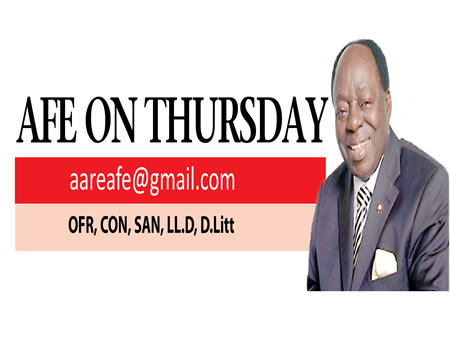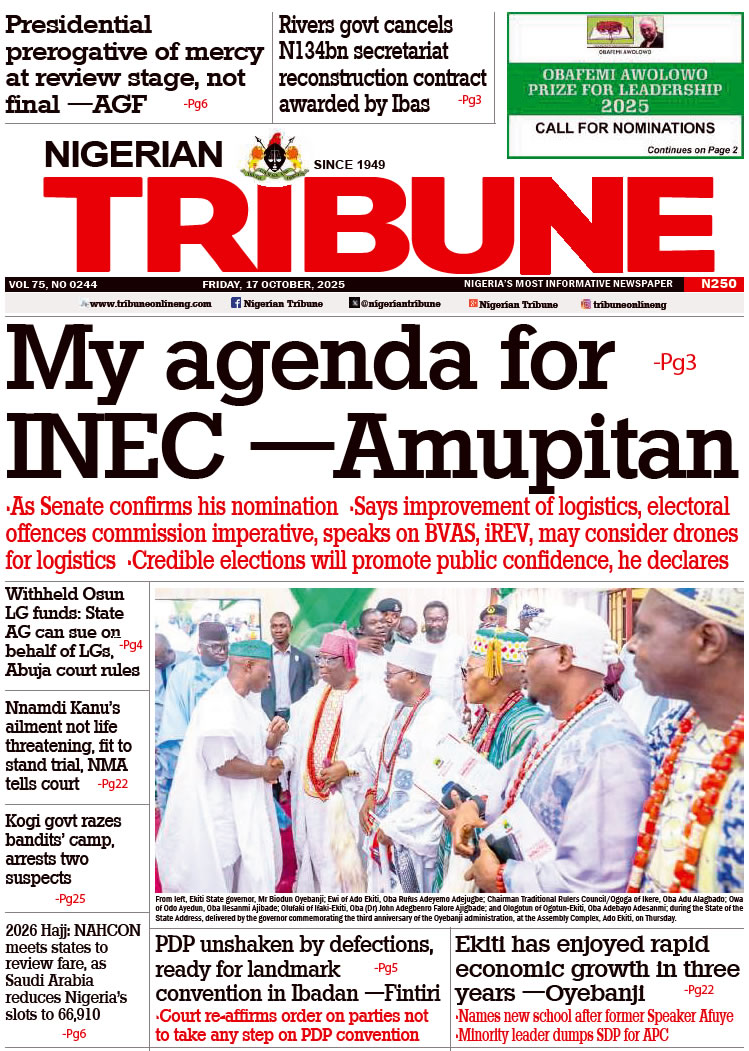IN the penultimate edition, I discussed the incidence of the national minimum wage which a Bill before the National Assembly proposes to include in the concurrent legislative list. Not unsurprisingly, this proposal has generated negative reactions from the Nigeria Labour Congress(NLC), the Trade Union Congress (TUC),which both embarked on a nationwide protest and from members of the public. Even some members of the National Assembly, who appear opposed to the idea inclusive of the majority leader of the House of Representatives, Alhassan Ado Doguwa, who reportedly stated that: “From what I am seeing now, it is clear that organised labour is against that Bill. I want to assure you that the House of Reps would give a listening ear to your message. We will still invite you to come and engage with the relevant committee of which I am a member. You will come and make your position fully. Your position will be heard at the committee level and when we come to plenary to consider the bill, members that are representing your respective communities, engage with them to do justice to that Bill and I can understand that the only justice would be to kill the bill. I want to advise please lobby members that you elected that you do not want the bill and make sure the bill is killed.”
While the above-referenced statement attributed to the Honourable Majority Leader depicts the people-centric mandate of the elected legislators, it, however, fails to take cognizance of the greater good and the ultimate benefits which the proposed move to include matters relating to the determination of minimum wage in the concurrent legislative list will confer on the entire membership of the labour unions. Even sadly, it further depicts the absence of a deeper understanding of a pertinent solution to one of the oldest problems facing the Nigerian workforce, i.e. the determination and enforcement of a minimum wage. One of the notable oppositions to the proposal is that the call to move the minimum wage to the concurrent legislative list was to enable the states to negotiate and fix their minimum wages, thereby giving the respective state governments higher leverage in such negotiations. Another contention is that such a move will not take into cognisance the protection of employees in government and organised private sector, and particularly, the unorganised, the unskilled and the vulnerable in the highly un-governed space known as the informal sector. Notwithstanding these contentions, there is a far greater advantage which will accrue when minimum wages are incorporated into the concurrent legislative list. As I will show, under the new proposal, the National Assembly can still provide a national minimum wage below which no state can go, thereby giving the unions the opportunity to negotiate higher state minimums from states with higher costs of living.
What concurrent legislative list connotes
In the determination of the scope of the powers contained in the Exclusive and the Concurrent Legislative List, the Supreme Court, in AG Federation v. AG Lagos State (2013) LPELR-20974(SC), held thus: “The Constitution itself has given the interpretation of the terms “Exclusive Legislative List” and “Concurrent Legislative List”. Whereas the former refers to the “List” in Part 1 of the Second Schedule to the Constitution, the latter refers to the “List” of matters set out in the First Column in part II of the Second Schedule to the Constitution with respect to which the National Assembly and House of Assembly may make laws to the extent prescribed, respectively, opposite thereto in the second column thereof… As for the Concurrent Legislative List, it is clear that both the National and State Assemblies can competently legislate on a matter concurrently having at the back of the legislators’ mind, the operation of the doctrine of covering the field (as summed up earlier)”
From the foregoing, and indeed from a long line of judicial authorities, matters listed in the Concurrent Legislative List are those which both the National Assembly and the states Houses of Assembly can legislate upon. This therefore connotes that if matters relating to minimum wage are moved to the Concurrent Legislative List, it does not rob the national assembly of the powers to still make laws on the same subject and by a principle of constitutional law known as ‘covering the field’, where a matter legislated upon is in the concurrent list and the Federal Government has enacted a legislation in respect thereof, where the legislation enacted by the State is inconsistent with the legislation of the Federal Government, it is indeed void and of no effect for inconsistency. This therefore connotes that no state House of Assembly can make any law which purports to be inconsistent with any law(s) made by the National Assembly relating to, for instance, the determination of minimum wage. This was as decided by the Supreme Court in AG Ogun State &Ors. v. AG Federation (1982) NSCC (Vol. 13) 1. The protests by the labour unions about the proposed introduction of minimum wage in the Concurrent Legislative List is therefore rather misconceived.
Other countries operate the hybrid (concurrent) system
As I had noted in the first edition, most advanced economies of the world practice a hybrid minimum wage system wherein the regional/state and the federal government have a say in the determination of what is paid as minimum wage to workers. In the United States, minimum wage is determined by labour law as well as a myriad of state and local laws. Employers generally have to pay workers the highest minimum wage prescribed by federal, state or local laws. As of January 2020, there were 29 states and D.C. with a minimum wage higher than the federal minimum. This results in almost 90% of U.S. minimum wage workers earning more than $7.25. Due to this symbiotic interphase between federal, state and local laws, the Congressional Budget Office of the United States released a report in 2021 which estimated that incrementally raising the federal minimum wage to $15 an hour by 2025 would benefit 17 million workers. In China, there is not one minimum wage set for the entire nation as different parts of the nation have very different standards of living. Instead, the local governments of each province, municipality or region play an all-important role in setting minimum wages for the local workforce, having due consideration to the differences in standard of living. According to the country’s Employment Promotion Plan, minimum wages are supposed to increase in accordance with local living standards by at least 13 percent through 2015 and be no less than 40 percent of the average local wages. Minimum wages under such policies increased by
an average 12.6 percent rate between 2008-2012. However, the growth rate of minimum wage levels decreased in 2016, reflecting the Chinese government’s effort to reduce pressure on enterprises resulting from the uneven growth between labor costs and production rates.
Owing to the disparity in the standard of living across all the states of the federation, it will be unreasonable, unfair, unjust, and inimical to wellbeing to set a standard minimum wage for all workers in both the public and private sector in Nigeria. The reason is quite obvious.Some states, like Lagos and Rivers, with higher costs of living, have more capacity to pay a higher minimum wage to their works than Gombe State, for instance. This therefore means that if the labour unions in Lagos and Rivers State can dialogue and properly negotiate the welfare of its members with the states’ government, they can reach a consensus which will better give considerations to the high cost of living in those states. It is highly unreasonable to pay N30,000 minimum wage to a worker in Lagos state and pay the same in Gombe State, for instance. In equal terms, the amount which may be used to secure a 3-bedroom flat in Ado Ekiti State may not be enough to rent and maintain a self-contained room in Abuja. Without a doubt, the high cost of living in some parts of Nigeria will make the payment of a unified minimum wage seem like a waterdrop in the ocean in some states.
National Assembly can still set national minimum wage below which no state can go
Just like in the United States where more than 30 out of 50 states pay a higher minimum wage than that which was determined at the national level, such can indeed be the situation here in Nigeria. Under this arrangement, the National Assembly will set the national minimum wage which will serve as the benchmark below which no state can go. Labour will then identify specific states where it can enter into negotiations for wages higher than the national minimum. All that is needed is for the labour unions to better study the facts as they are available and utilise the avenue of the proposed powers to be conferred on the State Houses of Assembly to sponsor laws which will benefit the working populace. While I understand that the Unions are generally distrustful of governments across all levels, it is imperative that this opportunity to win a major victory for the worker is not lost simply out of a proper understanding of the gains that can be negotiated if the proposal is passed.
AARE AFE BABALOLA, SAN CON
YOU SHOULD NOT MISS THESE HEADLINES FROM NIGERIAN TRIBUNE
We Have Not Had Water Supply In Months ― Abeokuta Residents
In spite of the huge investment in the water sector by the government and international organisations, water scarcity has grown to become a perennial nightmare for residents of Abeokuta, the Ogun State capital. This report x-rays the lives and experiences of residents in getting clean, potable and affordable water amidst the surge of COVID-19 cases in the state.
WATCH TOP VIDEOS FROM NIGERIAN TRIBUNE TV
- Relationship Hangout: Public vs Private Proposals – Which Truly Wins in Love?
- “No” Is a Complete Sentence: Why You Should Stop Feeling Guilty
- Relationship Hangout: Friendship Talk 2025 – How to Be a Good Friend & Big Questions on Friendship
- Police Overpower Armed Robbers in Ibadan After Fierce Struggle






